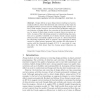Free Online Productivity Tools
i2Speak
i2Symbol
i2OCR
iTex2Img
iWeb2Print
iWeb2Shot
i2Type
iPdf2Split
iPdf2Merge
i2Bopomofo
i2Arabic
i2Style
i2Image
i2PDF
iLatex2Rtf
Sci2ools
CLA
2006
2006
Using FCA to Suggest Refactorings to Correct Design Defects
Abstract. Design defects are poor design choices resulting in a hard-tomaintain software, hence their detection and correction are key steps of a disciplined software process aimed at yielding high-quality software artifacts. While modern structure- and metric-based techniques enable precise detection of design defects, the correction of the discovered defects, e.g., by means of refactorings, remains a manual, hence error-prone, activity. As many of the refactorings amount to re-distributing class members over a (possibly extended) set of classes, formal concept analysis (FCA) has been successfully applied in the past as a formal framework for refactoring exploration. Here we propose a novel approach for defect removal in object-oriented programs that combines the effectiveness of metrics with the theoretical strength of FCA. A case study of a specific defect, the Blob, drawn from the Azureus project illustrates our approach.
| Added | 30 Oct 2010 |
| Updated | 30 Oct 2010 |
| Type | Conference |
| Year | 2006 |
| Where | CLA |
| Authors | Naouel Moha, Jihene Rezgui, Yann-Gaël Guéhéneuc, Petko Valtchev, Ghizlane El-Boussaidi |
Comments (0)

